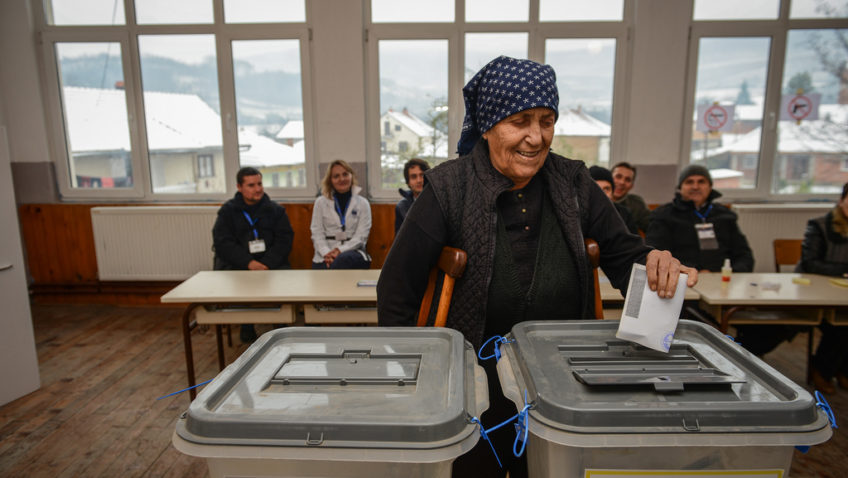Each week we bring you the ten most important pieces of news from Eastern Europe.
Compiled by: Hristo Voynov and Kristijan Fidanovski
- Internal dissent on the EU Refugee Treaty
Czech Republic, Hungary, and Poland are failing to meet their legal obligations by refusing to take in their quota of refugees. This may lead to sanctions against them. The Polish Foreign Minister likened this to blackmail while the Czech interior minister claimed that no country is taking their legally required minimum number or refugees. The three, along with Slovakia, form the Visegrad Group and had a meeting on the issue order for them to develop a unified message in response to the EU.
- Unclear outcome in Kosovo elections
In Sunday’s snap parliamentary elections in Kosovo, the ruling coalition headed by PDK came first, but the biggest focus was on the opposition party Vetevendosje, who surprisingly came second and ahead of a former ruling party. PDK losing ground to Vetevendosje comes after some major corruption allegations among the former, but it is also somewhat worrying due to the perceived radicalism of the latter demonstrated by their recent use of teargas in the Parliament.
- Major protests against corruption throughout Russia
An estimated 1000 are arrested for protesting in anti-corruption protests across Russia, ranging from cities as far apart as Saint Petersburg to Vladivostok. Prominent opposition figure Alexei Navalny was arrested for telling Moscow protesters to proceed with the march outside of the conditions that the city gave the protesters. The protests are far from a threat to the Russian regime, but the fact that the protests are unflinching and going on throughout Russia is something that the country’s leadership must consider.
- Bosnian Genocide Denial Punishment Law Angers Serbs
Proposed amendments to Bosnia and Herzegovina’s criminal code to make the denial of genocide and crimes against humanity punishable by a prison sentence have sparked furious reactions from Bosnian Serbs. The Serb-perpetrated Srebrenica genocide, which was the darkest point of the Yugoslav Wars in the 1990s, is thought to have claimed over 8000 Bosniak lives in 1995.
- Electoral Changes in Moldova
The Venice Commission found that Moldova’s electoral change was “inappropriate” in that it would allow for undue influence in the future. These changes have prompted protests both in support of and against the changes. Some members of the government believe that these allegations were inaccurate, while Hungary seemed more willing to listen to the Commission’s findings on its own proposed electoral changes.
- Macedonia’s new government begins its ambitious foreign policy strategy
On Monday, Macedonia’s new prime minister Zoran Zaev, together with top-level officials from his government, made his first visit to Brussels, where he met with NATO and EU officials. This visit is part of an ongoing and comprehensive effort to revive Macedonia’s international position after severe setbacks on the path of European integration in recent years.
- Foreign propaganda laws in Hungary and Moldova
Hungary passed a law which severely limits foreign funding for local NGOs while a law in Moldova may ban foreign TV programs that it deems to be propaganda. The two have the same ideas in mind, but with opposite targets. Hungary’s laws are geared towards preventing the spread of liberalism, while Moldova wants to prevent Russian influence. Russia itself is expressing interested in preventing foreign influence in the form of election meddling, much like it is accused of by the west.
- Bulgarian PM Borisov visits Ankara
Talks between Borisov and Turkish prime minister Yildirim seem to suggest a warming in Bulgarian-Turkish relations, which are otherwise strained due to issues over the status of the Turkish minority in Bulgaria and long-term historical tension. In a statement after the talks, Yildirim thanked Borisov for Bulgaria’s support after the attempted coup last summer.
- Ukraine in NATO?
Ukraine makes joining NATO a priority to follow in the coming years, which may be very unrealistic. Allowing a formed Soviet republic into NATO would be seen as a huge provokation by Russia, and the conflict in Donbas would definitely be seen as a security risk by those already in NATO. However, the need for cooperation between Ukraine and NATO is a constant, such as the revelation that the Russian diplomats expelled from Moldova recently were helping recruit for the rebels in Ukraine.
- Serbia’s Vucic plans lavish inauguration ceremony
Often criticised for his wasteful handling of the national budget as Prime Minister, Serbia’s president-elect Aleksandar Vucic has announced a lavish inauguration ceremony to be held on June 23. Vucic’s resounding victory in April’s presidential elections indicated overwhelming popular support for his pro-European foreign policy course, albeit accompanied with increasing illiberalism at home.


0 comments